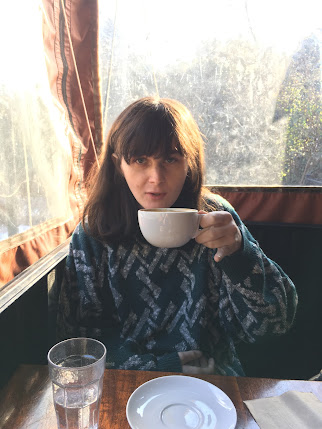Really I’m just starting to understand sleep. I can feel it in my body I’m going to die some day. I don’t know if my death is already in me or if it’s waiting for me somewhere out there. I can set myself down at 11:30, fall asleep by midnight, and wake up refreshed at 7 AM. In college most mornings I woke up hungover, even if I only drank 3 nights a week. Even these days, if I let myself sleep for 12 hours—something my body, I know, aches to do all the time, especially on weekends when I let it—and wake up at 1 PM, I’ll feel myself sinking again by 3. Death is a simple, neutral fact, which makes grief love with nowhere to go. How are we going to bring together these two identical opposites? The first time I went under for a minimally invasive surgery, 3 seconds before the anesthesia started tingling in my hand and forearm I heard myself think, “it’ll happen any second and I won’t be there for it.” Then a nurse was nudging me awake, telling me it’s time to go.
I
remember what the haircutter said in that William Carlos Williams poem:
Of
death
the
barber
the
barber
talked
to me
cutting
my
life
with
sleep
to trim
my
hair—
It’s
just
a
moment
he
said, we die
every
night—
So much of 20th century writing feels so typy. You can feel the punchiness of the language and grammar, even the punctuation from the bulky physicality of thinking [through/with] a typewriter. I feel some Hemingway here in the lean, athletic nouns and verbs: death, barber, barber, talked, cutting, life, sleep, trim, hair, moment, die, night. Not a syllable is wasted. This healthful minimalism gives the speaker the quick credibility to tell us how their smalltown barber paraphrased Shakespeare’s “to sleep, perchance to dream,”—just as (later) “to the cue” comes from the stage as much as the studio—so that death and sleep really are just two different ways to dream.
All these efforts in the 1st 3 stanzas of W.C.W.’s moment poem are just different, coordinated ways to point toward our most familiar and only truly universal experience: living in a body that rots. We use metaphors—coming from the larger realm of imagination—to get at the flesh. We are such carnal creatures, we experience everything [through/with] our senses, yet we have such a vastly abstract center (network?) for it all. At least that center depends (to use another W.C.W. word) on an imperfect network: the body that always, some day, betrays itself. So we use the physical world to describe the mental one. Metaphor.
Sleep, meet death.
All my life I have been studying sleep. Only now at 23 can I fall asleep almost on command. Just let your body rest and it will go under. That’s it aching to die. We are born with that basic moment in us. So it’s literally, physically true that we die (ie, lose consciousness) every night—and whenever we go under anesthesia or drink until we black out. No pressure, no sweat. Just a simple, neutral fact. You know what Yeats said, paraphrasing Coleridge: “I call it death-in-life and life-in-death.” Two halves of one whole. Donald Hall always talked about “poetry’s continuous observation that opposites are identical,” proof, example, and demonstration of itself. Here comes Part 2 of W.C.W.’s thesis, again a variation on our most basic experience (we’ll never be there for):
And of
the newest
ways to grow
hair on
bald death—
I told him
of the quartz
lamp
and of old men
with third
sets of teeth
to the cue
of an old man
who said
at the door—
Sunshine today!
“Sunshine today!” Carpe Diem. You can hear the doorbell chime as that cheerful man walks into the moment. Even these old men fighting the life-long process of death with dentures and balding cream are alive to fight it, alive by fighting it. That minimally invasive surgery came after 5 months of waking up and shitting yellow bile. The doctor told me the onset of these symptoms in my early 20s was unavoidable. Sometimes when I’m really high I know in my bones I will die of colon cancer 4 generous decades from now. My teeth are crooked and yellow. I stopped wearing my retainer 3 days after I got my braces taken off. I drink 3 cups of coffee a day. I’m a goner. So are you. We’re both so alert. Right now in this library you can hear the quiet racket of your hair growing
for which
death shaves
[you] twice
a week
Works Cited:
Spring and All, XIV. From Spring and All, reissued by New Directions. Copyright © 1962, 2011 by William Carlos Williams
Speech: “To be, or not to be, that is the question” BY WILLIAM SHAKESPEARE (from Hamlet, spoken by Hamlet), Public Domain, courtesy of the Poetry Foundation
Copyright Credit: From THE COLLECTED POEMS OF W.B. YEATS edited by Richard Finneran. Revisions and additional poems copyright © 1983, 1989 by Anne Yeats. Editorial matter and compilation copyright © 1983, 1989 by Macmillan Publishing Company. Reprinted by permission of Scribner, an Imprint of Simon & Schuster, LLC.
Source: The Collected Poems of W. B. Yeats (Macmillan Publishing Company, 1989)
Hall, D. (2019). A Carnival of losses: Notes nearing ninety. Mariner Books : Houghton Mifflin.
Robin Arble’s poems have appeared in beestung, Impossible Task, Midway Journal, Quarter After Eight, Passages North, Poetry Online, and Up The Staircase Quarterly, among others. She studied literature and creative writing at Hampshire College and lives in western Massachusetts. https://linktr.ee/arblerobin.


